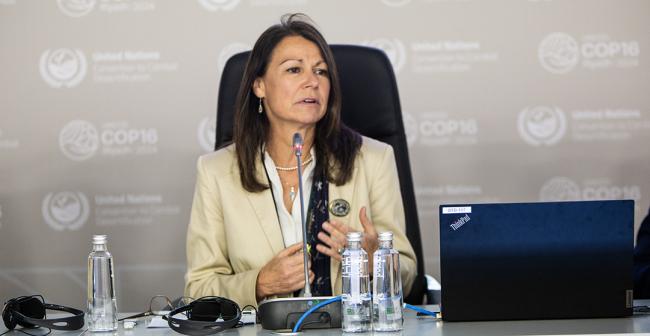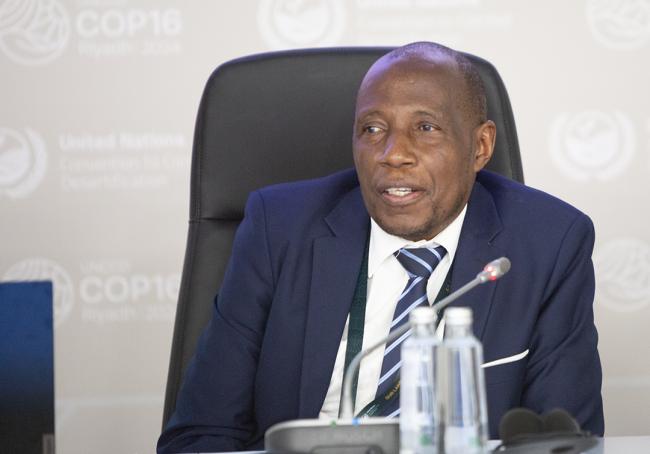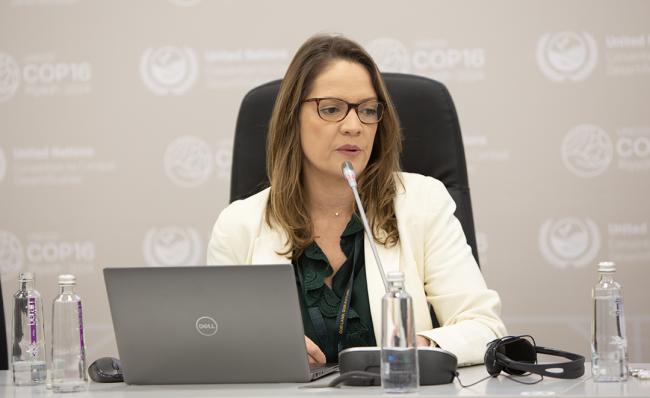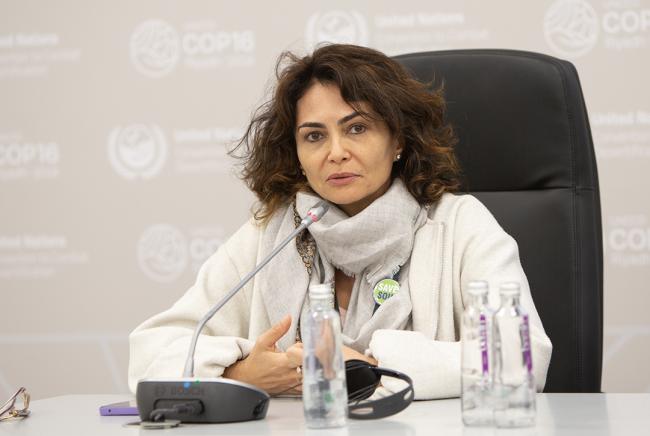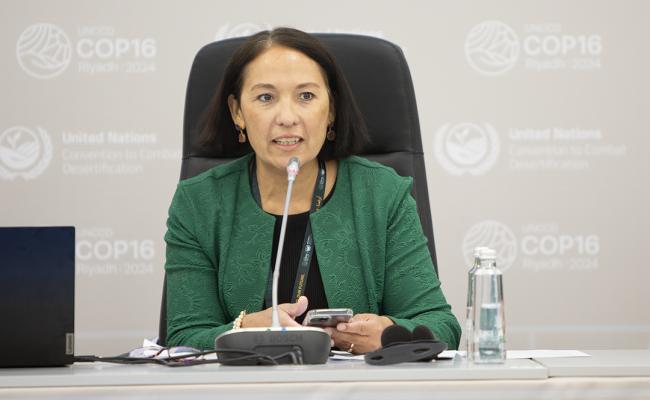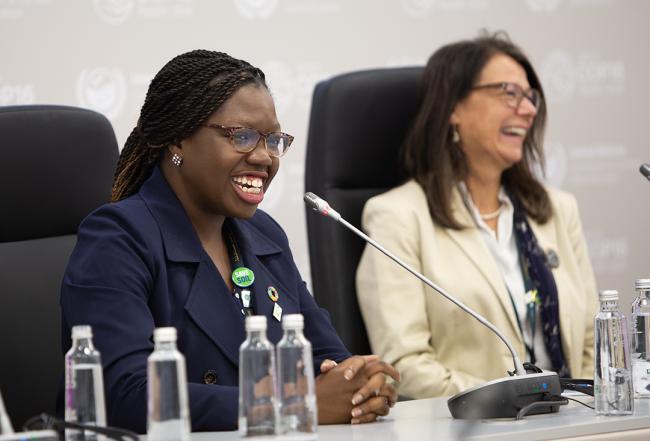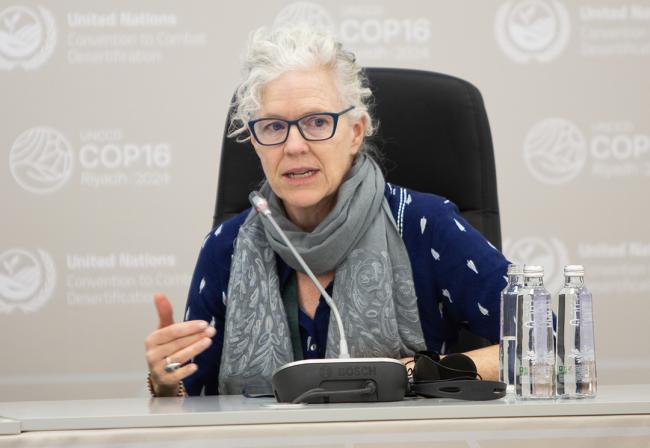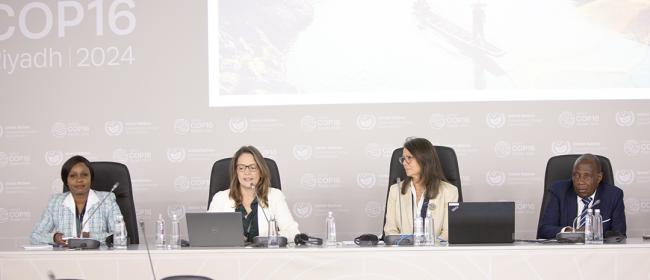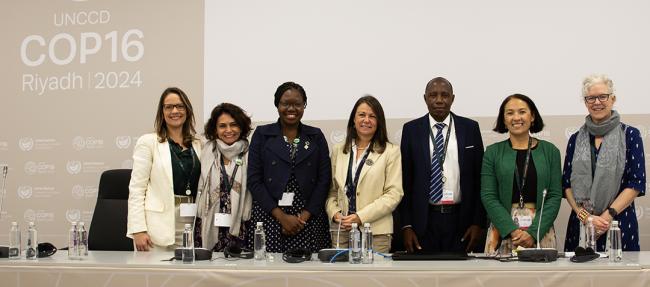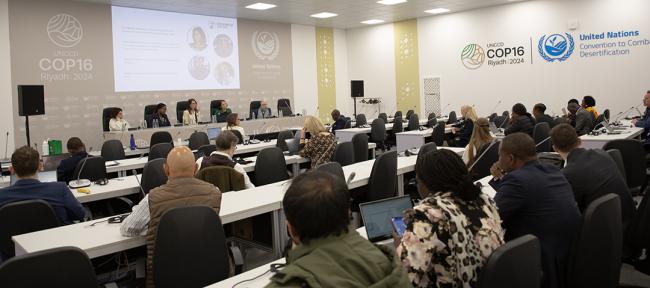About
The Freshwater Challenge to accelerate restoration of rivers and wetlands by 2030 has attracted 50 countries, and raised high hopes that it can provide a strategic way to help countries meet national commitments across the three Rio Conventions.
The Freshwater Challenge is a country-led initiative launched in 2023 to step up delivery of commitments under multiple UN conventions on climate, biodiversity, desertification, and wetlands. Fifty countries have already joined the Challenge. During this event, participants highlighted water as “the through line” across the conventions, and shared ideas for how to move forward.
Christine Colvin, World Wide Fund for Nature (WWF), moderated the session. In opening remarks, Cathrine Mutambirwa, UNCCD, described the Freshwater Challenge as one of the most exciting initiatives that the UNCCD is a part of, because of its potential to bring together the three Rio Conventions in the context of water security. She noted that achieving land degradation neutrality (LDN) requires integrating land and water strategies. She welcomed the inclusion of the Freshwater Challenge in the Riyadh Action Agenda, which was launched at COP 16 and aims to mobilize state and non-state actors to deliver solutions for land degradation, desertification, and drought.
Edward Samuriwo, Ministry of Environment, Climate and Wildlife, Zimbabwe, noted his country will host the 15th meeting of the Conference of the Parties (COP 15) to the Ramsar Convention on Wetlands in 2025. He stressed the importance of supporting implementation of the Ramsar Convention as it offers synergies with the UNCCD through the connectivity of water and forests.
Paula Martinelli, Wetlands International, provided an overview of the Freshwater Challenge, explaining the initiative aims to accelerate, elevate, and substantiate the restoration of 300,000 km of degraded rivers and 350 million hectares of degraded wetlands by 2030, as well as conserve intact freshwater ecosystems. She noted that the Challenge has been championed by, for example, the Governments of Colombia, Democratic Republic of Congo, Ecuador, Gabon, Mexico, and Zambia. She explained that it was launched at the UN 2023 Water Conference as a call for governments to commit to clear targets, in their updated National Biodiversity Strategies and Action Plans (NBSAPs), Nationally Determined Contributions (NDCs), and National Implementation Plans (NIPs) for achieving the Sustainable Development Goals (SDGs), to urgently restore healthy freshwater ecosystems.
During the ensuing panel discussion, Iara Bueno Giacomini, Ministry of Environment and Climate Change, Brazil, noted that her country is the size of a continent, with biomes ranging from tropical forests to arid areas. She welcomed the Freshwater Challenge as a strategic agenda that allows governments to bring actors together to collaborate and create synergies across multiple conventions.
Fleur Downard, Department of Climate Change, Energy, the Environment and Water, Australia, cited the example of the Murray-Darling Basin as a case study in restoration efforts. She explained that Australia’s national government had secured constitutional power to regulate the Basin, which is the country’s food bowl, its largest freshwater area, and home to 16 Ramsar wetland sites and 35 endangered bird species. She noted that, after setting limits on how much water can be taken from the Basin for commercial use, the Murray-Darling Basin Authority (MDBA), a statutory body, has worked with farmers to install water-efficiency infrastructure in exchange for returning ownership of the saved water to the MDBA, which in turn diverts this water for environmental needs, for example, to Ramsar wetland sites.
Chiyedza Heri, Birdlife Zimbabwe, welcomed the Freshwater Challenge because it allows civil society organizations (CSOs) to contribute through regional knowledge exchanges and provides support to governments on how to accelerate the best outcomes for people and the planet.
Andrea Erickson, The Nature Conservancy (TNC), emphasized how CSOs have self-organized through the Freshwater Challenge to offer support to governments, citing the example of TNC’s work to help Ecuador work more closely with Indigenous Peoples, through a fluvial reserve mechanism.
In a question-and-answer session, Carolyn Hall, CEO and Managing Director, Mulloon Institute, Australia, noted that, in Australia, there is a gap between national obligations and what is happening on the ground, and asked how CSOs can link more effectively to the Challenge. Downard mentioned opportunities in Australia for CSOs to engage with reforms to the National Biodiversity and Conservation Act and through public consultations on the forthcoming review of the Murray-Darling Basin Plan. Heri advised CSOs facing barriers in the regulatory environment to work with the public sector, as government officials understand the policies better than anyone else and can advise on the best way for people to achieve their aims.
A delegate from Moldova asked how best to set targets for water-related ecosystems. Martinelli explained that the technical working group associated with the Freshwater Challenge is addressing two main areas: how to prioritize the rivers and wetlands that deliver the most ecological benefits; and identifying which aspects of ecosystem health can be measured and reported. She noted that the Freshwater Challenge is not seeking to create any new reporting requirements, but rather to ensure that reporting actually leads to action on the ground.
Downard commented that when the Murray-Darlin Basin Plan set its original limits for sustainable diversion in 2012, how climate change would affect conditions across the Basin was not taken into account. A process to set new targets, she said, must be underpinned by scientific data. A delegate from the Commonwealth Scientific and Industrial Research Organisation (CSIRO), Australia, highlighted the work of his agency in Earth observation for ecological response monitoring, and offered to contribute their skills to advance the Freshwater Challenge.
Organizer: WWF and Wetlands International
Contact: paula.martinelli@wetlands.org
Websites: https://www.worldwildlife.org/projects/the-freshwater-challenge,
https://www.freshwaterchallenge.org

